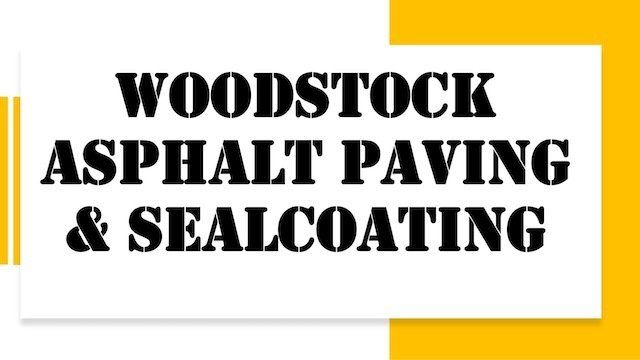Sealcoating
What is Sealcoating?
To put it simply, asphalt pavement is made up mostly of rock, stone, and gravel, as well as a binder. This binder, sometimes known as asphalt cement, holds the rock, or aggregate, together. The binder is made from various crude oils that have been distilled. Maintaining this binder is critical for preventing asphalt surfaces from deteriorating. Rain, ultraviolet radiation, and chemicals, when injected into the asphalt, will destroy the binder, causing the asphalt to disintegrate. This will continue, resulting in a brittle surface. It is critical to execute a maintenance program that includes sealcoating to lessen the effects of these elements and to extend the life of your parking lot or driveway.
Sealcoating will add a layer of protection against the elements, such as water, oils, and UV rays. Sealcoating also provides a slip-resistant surface with a rich black finish that beautifies the parking lot or driveway when applied according to manufacturer's standards. Sealcoats are typically acrylics or bituminous-based compounds. One of the foregoing emulsions is blended with water, silica sand, polymer additives, and additional proprietary fillers and solids to make a liquid sealcoat. Brush, spray, or squeegee can be used to apply these items. A regular sealcoating program will more than double the asphalt's life expectancy, saving you money in the long run. Rather of spending thousands of dollars on new pavement, it is more cost effective to maintain it for pennies on the dollar per square foot.
Follow the critical measures outlined below when applying a sealcoating solution to ensure maximum protection and performance:
- At the very least, two coats should be applied.
- Temperatures must be at least 50 degrees Fahrenheit and increasing for at least 24 hours. When temperatures are expected to drop below 50 degrees, do not apply.
- Do not use if rain is expected within the next 24 hours.
- Allow 24 hours for the sealcoat to cure after it has been applied before permitting vehicle traffic back on the surface.
To summarize, sealcoating your asphalt pavement every two to three years will significantly increase its life at a low cost. Sealcoating reduces oxidation, stops weather damage, and improves the appearance of pavement when applied correctly and at the right time.
If you have any questions about sealcoating or any other pavement maintenance or equipment needs, call Woodstock Asphalt Paving & Sealcoating.
Call us today at 404-724-8034
What factors affect sealcoating cost?
Labor Costs
When it comes to weather conditions and material costs, some areas are more convenient than others. Because certain areas have harsh weather due to the local climate, labor expenses may be greater than in other areas, there is no single pricing for a professional sealcoating work.
The Type of Sealer you will use
Coal Tar Emulsion
Pros:
If you're searching for a cheap and long-lasting sealant, coal tar is the way to go. You'll have an extra layer of defense against fuel spills, motor oil pollution, water, and the sun's UV rays. If you don't apply a high-quality sealer like this one, these elements might cause your asphalt to crack early or perhaps crumble away completely.
Cons:
Coal tar is hazardous to the environment and human health. As a result, it is prohibited in several towns. Because it's naturally dark gray, it doesn't have the dark black color of new asphalt.
Asphalt Emulsion
Pros:
If coal tar isn't accessible in your location, you can use an asphalt emulsion instead. It's water-repellent. Asphalt emulsions, unlike coal tar, produce a more pleasing dark black color.
Cons:
The asphalt emulsion sealant is not UV resistant, which is a disadvantage. It doesn't offer a lot of protection. It is only present for a single season and fades rapidly.
Acrylic
Pros:
Because it comes in a variety of colors, acrylic is ideal for tennis courts and shopping mall parking lots. It's eco-friendly, long-lasting, and water-resistant. It can last up to seven years depending on traffic before needing to be renewed.
Cons:
The disadvantage is that it is the most expensive option.
Fast Dry
Pros:
Because it cures in less than an hour, it's popular among road crews and parking lot owners.
Cons:
Buying in small quantities is difficult, resulting in a larger price tag.
Oil Based
Pros:
There aren't many benefits to using an oil-based sealer.
Cons:
It takes the longest of the conventional sealer alternatives to cure, usually seven days. As a result, it's a poor alternative for individuals who need to draw lines. It has a strong odor that lingers for days. It does not protect against UV radiation or petroleum chemicals, unlike coal tar sealants.
How many coats of Sealer do you need to apply?
What is the nature of your project? More coats, more traffic!
It all depends on how much traffic you anticipate when it comes to applying a coat or two to preserve your asphalt from deteriorating.
One layer should suffice in low-traffic areas such as driveways and backyards. If you have a high-traffic location, such as a parking lot or construction site, two to three layers will suffice to defend against anything from rain to snow and ice.
Sealing Preparations
Keep in mind that the sealing preparations are frequently more time-consuming than the coating itself. Sealing preparation, such as cleaning and repairs, might take a full day if the drying time is factored in. In the meantime, applying the sealer takes only a few hours each application.
Cleaning
In order for the sealant to bind, any oil, dirt, or debris must be removed. If you don't clean the surface well before sealcoating, the sealcoat will flake and shed.
You can clean the surface yourself with a gas blower, degreaser, scrub brush, and water hose.
If it's excessively oily or full of debris, though, it should be handled by professionals.
Asphalt Repairs
Sealcoating is used to protect the asphalt's surface. When it comes to repairing chips or cracks, though, it's ineffective. It's too late to apply a sealant once you notice these flaws. If you just cover them up, they'll quickly turn into potholes, requiring more costly repairs in the future.
Prior to sealcoating, these defects must be repaired. Smoothing out or filling up any cracks, chips, or fissures will cost between $1 and $4 per square foot. The more cracks you have on your surface, the more crack filling and patching you'll have to pay.
Surface Size
The size of the surface depends on the project you're working on. A little residential driveway, for example, would be smaller than a business parking lot. As a result, less sealant and work will be required. In comparison, it is less expensive to sealcoat a residential driveway.
However, the higher the labor cost per square foot, the smaller the area. This is due to the fact that you'll have to pay for the contractor's transportation and preparation time.
Mobilization Costs
Time is money, as they say, and contractors appear to be no exception. There will be increased mobilization expenses if a project takes longer to complete due to shorter days or multiple coatings required. The distance between the project location and the contractor's base is another element that influences this fee. This is one reason why you should choose a local asphalt contractor like Woodstock Asphalt Paving & Sealcoating.
Project Complexity
Sealcoating is made faster and easier by using a machine like an asphalt sprayer. In addition, you may cover more ground in less time.
However, hand application may be required in places near buildings, landscaping, and other sensitive areas. The cost of the project rises as a result of the additional labor and time required.
Material Costs
The price of materials in asphalt sealers, like as oil, might fluctuate depending on the season. It is possible that the price of the sealer will rise if it is created at a period when these ingredients are more expensive.
We proudly serve the following cities: Acworth, Alpharetta, Atlanta, Austell, Brookhaven, Canton, Cartersville, Dallas, Decatur, Doraville, Douglasville, Duluth, Dunwoody, East Cobb, Hiram, Johns Creek, Kennesaw, Lilburn, Mableton, Marietta, Milton, Powder Springs, Roswell, Sandy Springs, Stone Mountain, Suwanee, Tucker, Villa Rica, and Woodstock Ga.
Copyright 2022 | Woodstock, Ga 30188
This is a referral website. We connect you to a licensed professional


